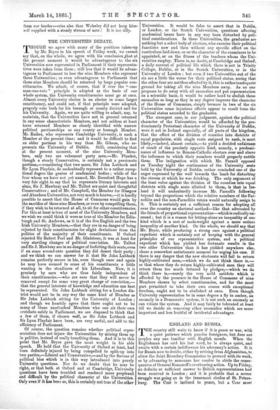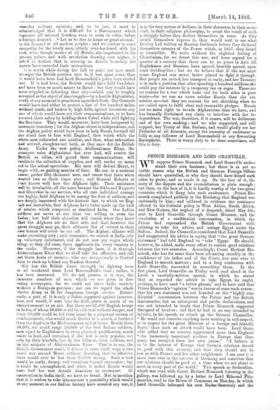ENGLAND AND RUSSIA. ENGLAND AND RUSSIA.
THE country still waits to know if it is peace or war, with a quiet patience which puzzles foreigners, but does not perplex any one familiar with English moods. When the Englishman has said his last word, he is always quiet, and awaits with a certain indifference his adversary's action. It is for Russia now to decide, either by retiring from Afghanistan, to allow the Joint Boundary Commission to proceed with its work, or by advancing to announce her resolve to abide the consequences of General Komaroff's overbearing action. Up to Friday, no definite or sufficient answer to British representations had been received in London ; and it is probable that a severe struggle was going on in the innermost circles of St. Petersburg. The Czar is inclined to peace, but a Czar must
coneider military opinion ; and, to be just, it must be acknowledged that it is difficult for a Government which represses all internal freedom even to seem to retire before a foreign demand. " Let us be free at home or great abroad," is the demand of all modern peoples ; and we confess to some sympathy for the lonely man, utterly over-burdened with his task, who, though master of all Russia, sits imprisoned in his gleamy palace, and with revolution drawing ever nigher, is asked to declare that in crossing an Asiatic boundary his agents hare exceeded their instructions.
Lt is worth while during the lull to point out how much stronger the British position now is, if war must come, than it would have been had Lord Beaconsfield's policy been carried opt. If it had been, the British would have held Candahar, sad have been so much nearer to Herat ; but they would have been crippled in defending that city—which may be roughly accepted as the object of the struggle—by a hostile Afghanistan, ready at any moment to pour down upon their flank. Our Generals would have had either to protect a line of five hundred miles, without roads, and broken by high hills, against incursions any one of which would have cut their communications, or to have secured their safety by holding-down Cabul while still fighting the Russians. They would, moreover, have been hampered by incessant treachery ; for the Afghan object is independence, and the Afghan policy would have been to help Russia forward till she stood face to face with England, then watch while the white men exhausted one another, and then, when exhaustion had arrived, slaughter-out both, as they once did the British Army. Under the new policy, Abdurrahman Khan, the strongest ruler Afghanistan has ever had, will receive the British as allies, will guard their communications, will facilitate the collection of aupplies, and will render no mean aid in the actual operations. His men will defend Herat, to begin with, so gaining months of time. He can, in a national cease, gather fifty t,housand men, and renew that force when wasted two or three times over ; and General Roberts at Iowa knows well how the Afghans fight. Their assistance will be invaluable, all the more because the Sikhs and Rajpoots and Ghoorkas in our service, who all rate individual courage too highly, hold Afghans to be among the first of soldiers, and are deeply impressed with the historic fact, to which we English are insensible, that Afghans have twice made up the bulk of armies which conquered or desolated India. Our Indian soldiers are never at any time too willing to cross the latius ; but half their objection will vanish when they know that the Afghans are on their side, and that, however the peat struggle may go, their ultimate line of retreat to their own homes will never be cut off. The Afghan alliance will make recruiting easy ; and, remember, we recruit in India only is, voluntary enlistment, and do not now pay wages which bring, as they did once, three applicants for every vacancy in the ranks. Moreover, if the struggle lasts, it is through Abdurrahman Khan that we shall take the offensive, and call out those hosts of enemies who are always ready in Central Asia to start-up behind any Russian General:
Nor has the British direct strength for fighting been at all weakened since Lord Beaconsfield's time ; rather, it
has been increased. We do not possess. it is true, the immense numbers of men which we see given in fireeating newspapers, for we could not leave India entirely without a European garrison ; nor can we regard the whole Native Army as fit for dangerous foreign service. Notoriously, a part of it is only a Police organised against insurrection, and would, if sent into the field, prove as much of an embarrassment as an aid. But there are 57,000 English troops in India, of whom 30,000 could be collected without danger, and these 30,000 could be fed from home by a perpetual stream of reinforcements, who would reach Quetta in a month at furthest from the depots in the Mediterranean and at home. Beside these 30,000, we could range 50,000 of the best Indian soldiers, men equal to Englishmen in every physical qualification, much easier to feed, and recruited, if the war is only popular, not only by their kinsfolk, but by the hillmen, born soldiers, and by the subjects of Abdurrahman Khan. That is to say, the British Government could, if driven to exert itself, wage a two years' war around Herat without dreading that its effective force would ever be less than 70,000 strong. Such a task would be costly, dreary, and vexations beyond expression ; but• it could be accomplished, and when it ended Russia would
have half her vast Asiatic dominion to reconquer. Of iasurrection in India itself, we have no dread. Not to mention that it is useless to take into account a possibility which would at any moment in our ImAian history have arrested any war, it is in the very nature of Indians, in their character, in their statecraft, in their religious philosophy, to await the result of such a struggle before they declare themselves in arms. As they would themselves express it, they would wait to see what Destiny had written on Russian foreheads before they declared themselves enemies of the Power which, in 1857, they found so irresistible. We write without the slightest feeling of Chauvinism, for we detest this war, and have argued for a quarter of a century that there can be no peace in Asia till Englishmen and Russians have agreed, heartily agreed, upon some dividing-line ; but we do believe that if the war must come, England was never better placed to fight it through. Her people are united, her transport is ready, and her Treasury is in such a position that after spending a hundred millions she could pay the interest by a twopenny tax on sugar. Those are no reasons for a war which must end for both aides in pure waste—for we can no more subdue Russia than she can subdue us—but they are reasons for not shrinking when we are called upon to fulfil clear and reasonable pledges. Russia has no more right to invade Afghanistan than we have, and has formally disclaimed any claim to interfere with her independence. The war, therefore, if it comes, will be deliberate and of her own making ; and we who supported, and still support, her Treaty of San Stefano, and would gladly see her Protector of all Armenia, accept the necessity of resistance as fully as any follower of Lord Beaconsfield or any fire-eating Russophobe. There is weary duty to be done sometimes, and this is duty.



































 Previous page
Previous page